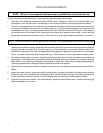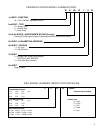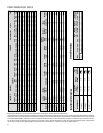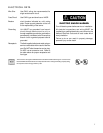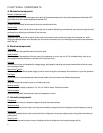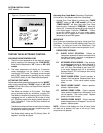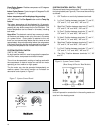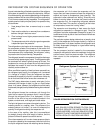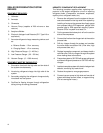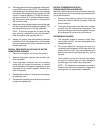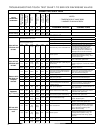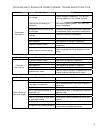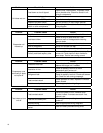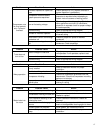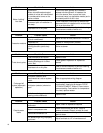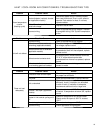
12
SEALED REFRIGERATION SYSTEM
REPAIRS
EQUIPMENT REQUIRED:
1. Voltmeter
2. Ammeter
3. Ohmmeter
4. Vacuum Pump (capable of 200 microns or less
vacuum.)
5. Acetylene Welder
6. Electronic Halogen Leak Detector (G.E. Type H-6 or
equivalent.)
7. Accurate refrigerant charge measuring device such
as:
a. Balance Scales - 1/2 oz. accuracy
b. Charging Board - 1/2 oz. accuracy
8. High Pressure Gauge - (0 - 400 lbs.)
9. Low Pressure Gauge - (30 - 150 lbs.)
10. Vacuum Gauge - (0 - 1000 microns)
EQUIPMENT MUST BE CAPABLE OF:
1. Evacuation from both the high side and low side of
the system simultaneously.
2. Introducing refrigerant charge into high side of the
system.
3. Accurately weighing the refrigerant charge actually
introduced into the system.
4. Facilities for fl owing nitrogen through refrigeration
tubing during all brazing processes.
HERMETIC COMPONENT REPLACEMENT
The following procedure applies when replacing com-
ponents in the sealed refrigeration circuit or repairing
refrigerant leaks. (Compressor, condenser, evaporator,
capillary tube, refrigerant leaks, etc.)
1. Recover the refrigerant from the system at the pro-
cess tube located on the high side of the system by
installing a line tap on the process tube. Apply gauge
from process tube to EPA approved gauges from
process tube to EPA approved recovery system.
Recover CFCs in system to at least 5%.
2. Cut the process tube below pinch off on the suction
side of the compressor.
3. Connect the line from the nitrogen tank to the suction
process tube.
4. Drift dry nitrogen through the system and unsolder
the more distant connection fi rst. (Filter drier, high
side process tube, etc.)
5. Replace inoperative component, and always install a
new fi lter drier. Drift dry nitrogen through the system
when making these connections.
6. Pressurize system to 30 PSIG with proper refrigerant
and boost refrigerant pressure to 150 PSIG with dry
nitrogen.
7. Leak test complete system with electric halogen leak
detector, correcting any leaks found.
8. Reduce the system to zero gauge pressure.
9. Connect vacuum pump to high side and low side of
system with deep vacuum hoses, or copper tubing.
(Do not use regular hoses.)



